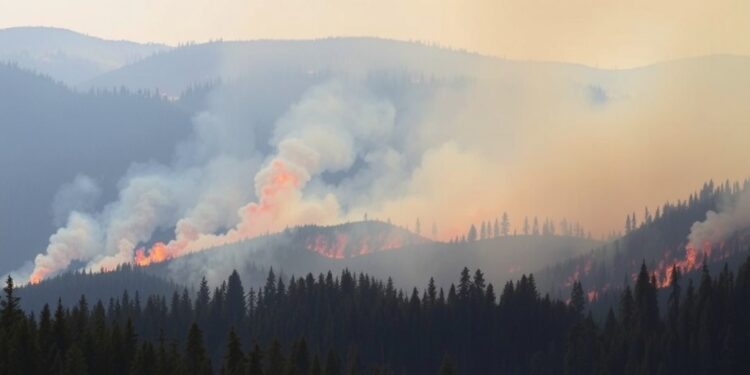
Climate change has emerged as a significant driver of intense wildfires, particularly in the vast and vulnerable landscapes of Canada. Recent findings derived from a comprehensive modeling study indicate an alarming trend towards increasing burn severity linked to fuel aridity and rising temperatures. Since the onset of the 21st century, Canada’s forests, which rank among the most forested and fire-prone regions of the Northern Hemisphere, have been battling seasons of unprecedented wildfire intensity. The events of 2023 served as a stark embodiment of this crisis, marking the worst fire season on record, leading to over seven times the historic average area burned.
One of the most critical metrics in assessing the ecological implications of wildfires is burn severity. This measure not only allows researchers to understand the immediate impacts of fire but also aids in evaluating the responses of ecosystems, the resilience of landscapes, and the effectiveness of fire management strategies. However, the scientific community faces significant challenges due to insufficient national-scale modeling of burn severity and its associated drivers, hampering our capacity to forecast long-term fire dynamics in a high-temporal-resolution context. This gap in knowledge is particularly concerning as climate change actively reshapes the interactions between wildfires and forest ecosystems across Canada’s diverse ecozones.
The recent study conducted by Weiwei Wang and colleagues offers groundbreaking insights into the interplay of various factors influencing burn severity. By leveraging 40 years of detailed spatiotemporal wildfire data, Wang et al. constructed a multinomial logistic regression (MLR) model that dissects the multifaceted drivers that contribute to the occurrence and intensity of forest fires. Their findings distinctly highlighted that fuel aridity—essentially, the moisture content of flammable vegetation—emerges as the most significant determinant of burn severity. Moreover, they identified summer months as particularly vulnerable periods for exacerbated fire conditions.
The data elucidated an alarming trend where the most extreme fire conditions have predominantly manifested over the past two decades. This trend reflects a growing urgency to address the ecological challenges posed by increased fire activity, particularly within Canada’s boreal forests, which serve as crucial carbon sinks that mitigate climate change impacts. In the northern regions of Canada, researchers have noticed a pronounced increase in burn severity, primarily driven by climate change dynamics. Conversely, in southern Canada, the interplay between fuel aridity and vegetation type assumes a more significant role, necessitating a nuanced understanding of regional fire behavior.
Jianbang Gan, in a corresponding Perspective piece, emphasizes the critical need for international cooperation amidst these escalating challenges. The boreal forests shared by the United States, Canada, and Russia represent a global carbon reservoir, encompassing 93% of the world’s boreal forest area. The collaboration among these nations is paramount for effective fire management strategies that safeguard these ecosystems. As wildfires continue to escalate in frequency and intensity, enhancing coordination among these regions will be essential to preserving the ecological integrity of the northern hemisphere.
The ramifications of wildfire intensification extend beyond immediate ecological impacts; they pose significant challenges to carbon emissions management. In an October 2024 study led by Jones et al., researchers pinpointed vegetation dynamics coupled with weather patterns as the primary drivers of forest fire carbon emissions from 2001 to 2023 in non-tropical areas worldwide. This underscores the interconnectedness of climate change, wildfire behavior, and their broader environmental consequences.
August 2024 witnessed another pivotal study by Balch et al., which revealed a troubling uptick in the growth rate and intensity of wildfires across the United States between 2001 and 2020. This increase parallels the trends observed in Canada, painting a concerning global picture of wildfire behavior amidst a changing climate. The findings accentuate a pressing need for monitoring and adapting fire management strategies in the context of increasingly volatile climate conditions.
The scientific community thus stands at a crossroads, faced with the imperative to deepen our understanding of wildfire behavior and its ecological implications. The complexities involved in modeling burn severity demand refined methodologies, incorporating multifarious factors such as regional climate variations, land cover types, and specific vegetation characteristics. As the interaction between fire and climate continues to evolve, researchers must remain vigilant in their efforts to assess long-term trends, aiming to bridge the gap in current knowledge.
Moreover, enhancing public awareness and discourse surrounding wildfire management is essential for fostering proactive community engagement and building resilience against uncontrollable fire risks. As climate change progresses, it brings with it not only heightened wildfire threats but also challenges in safeguarding biodiversity and mitigating ecological degradation. Educating communities about fire risks and effective management practices will play a crucial role in creating a sustainable future.
Further investigating individual components of burn severity could pave the way for innovative fire management practices that prioritize ecosystem health and resilience. The multifaceted nature of wildfire dynamics necessitates a comprehensive approach, integrating ecological, social, and political dimensions to formulate robust solutions. The development of predictive models driven by real-time data could revolutionize our capacity to anticipate fire behavior and implement timely interventions.
In conclusion, the interplay between climate change and wildfire dynamics represents one of the most profound environmental challenges of our time. The urgency for collaborative action cannot be overstated, as the consequences of inaction risk devastating biodiversity losses and significant carbon emissions. With record-breaking wildfire seasons becoming the new norm, the scientific community, policymakers, and the public must rally together to address the consequences of climate change. The pursuit of innovative solutions, grounded in sound scientific research and international cooperation, is critical to preserving the ecological balance essential for a sustainable future.
Subject of Research: Climate change and its impact on wildfire severity in Canadian forests
Article Title: Canadian forests are more conducive to high-severity fires in recent decades
News Publication Date: 3-Jan-2025
Web References: Science
References: DOI: 10.1126/science.ado1006
Image Credits: N/A
Keywords: Climate change, wildfires, burn severity, Canada, boreal forests, ecological impact, international cooperation, fire management, carbon emissions, vegetation dynamics.





